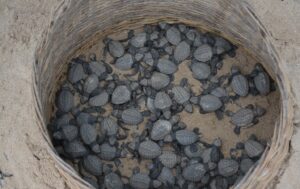Meridian Port Services Limited (MPS) is committed to championing sea turtle conservation drive along some coastal communities in the Greater Accra Region as part of its Biodiversity Action Plan.
The programme, which commenced in November 2018, involves the safe relocation of turtle eggs at risk in their natural environment into an enclosed hatchery replicating natural conditions, creating a conducive atmosphere for them to hatch and finally releasing the hatchlings into the ocean.
 Chief Executive Officer (CEO) of MPS, Mohammed Samara, during a visit to the site at New Ningo, revealed to the B&FT in an interview that the conservation programme has currently made some commendable progress so far. Between November 2018 and August 2020, 24,674 eggs were retrieved and brought to the hatchery, while 16,198 hatchlings were successfully released into the sea same period. The current hatchery has two Sea Turtle species namely; Olive Ridley (88%) and the Green Turtle (12%).
Chief Executive Officer (CEO) of MPS, Mohammed Samara, during a visit to the site at New Ningo, revealed to the B&FT in an interview that the conservation programme has currently made some commendable progress so far. Between November 2018 and August 2020, 24,674 eggs were retrieved and brought to the hatchery, while 16,198 hatchlings were successfully released into the sea same period. The current hatchery has two Sea Turtle species namely; Olive Ridley (88%) and the Green Turtle (12%).
World Turtle Day celebration
At the beginning of every summer season, humankind observes World Turtle Day to recognise the importance of turtles on earth. On this day, more awareness is created among people to encourage everyone to come together to save them. Turtles and tortoises are important for the earth to maintain its Flora and Fauna balance.
According to the World Wildlife Fund (WWF), which works to secure the environments in which both turtles and the people that depend upon them can survive, there is a continuous decline in the worldwide turtle population due to threats mainly from human acts including poaching, accidental capture during fishing expeditions and over-exploitation.
With the lessening population of this critical marine animal, it presents the challenge of getting ‘all hands on deck’ to work for the recovery of the species.
“In Ghana, one organisation that has committed to this cause is Meridian Port Services Ltd. (MPS), operators of the container terminal at the Tema Port. The company has, since, done some work and continue to champion the conservation of turtles,” Mr. Samara said.
“Starting off with a monitoring programme in 2017 as part of the Biodiversity Action Plan (BAP) for the Tema Port Expansion Project, the Management of MPS has, since, maintained the programme and developed it into a fully-fledged sustainable conservation project with the construction of a second hatchery in August 2020; here, rescued eggs are allowed to develop under suitable conditions into hatchlings and then released into the sea”. He said.
Public awareness initiative
The conservation programme, according to Mr. Samara, also involves the public awareness sessions where educational institutions and surrounding communities are informed about the importance of turtles.
There is also the training of local beach patrol teams who monitor and report on poaching activities and endangered eggs. All eggs identified as endangered are relocated to the hatchery where trained hatchery assistants transfer them into nests for development. With an over 80 percent success rate, the MPS conservation programme has seen the protection and release of over 100,000 eggs and hatchlings since its commencement.
MPS CEO noted that thier actions in this regard are part of the company’s Environmental Action Plan which is in line with the International Finance Corporation (IFC) Performance Standard (PS6) for Biodiversity Conservation and Sustainable Management of Living Natural Resources, the No-Net-Loss commitment, and the UN Sustainable Development Goal 15 of the 2030 Agenda for Sustainable Development which is devoted to “protect, restore and promote sustainable use of terrestrial ecosystems, sustainably manage forests, combat desertification, and halt and reserve land degradation and halt biodiversity loss”.
Besides the sea turtle conservation programme, MPS, as part of its Environmental Action Plan, undertakes regular monitoring of key environmental aspects relevant to its operations. These include, shoreline, marine water quality, marine sediment quality, marine biodiversity (plankton and benthos), wastewater quality, energy consumption, air quality and noise monitoring.
The overarching essence of the monitoring programme, he explained, is to enable MPS to manage and evaluate its environmental performance, continually improve, and ensure that its operation activities remain safe and do not adversely affect the environment.










